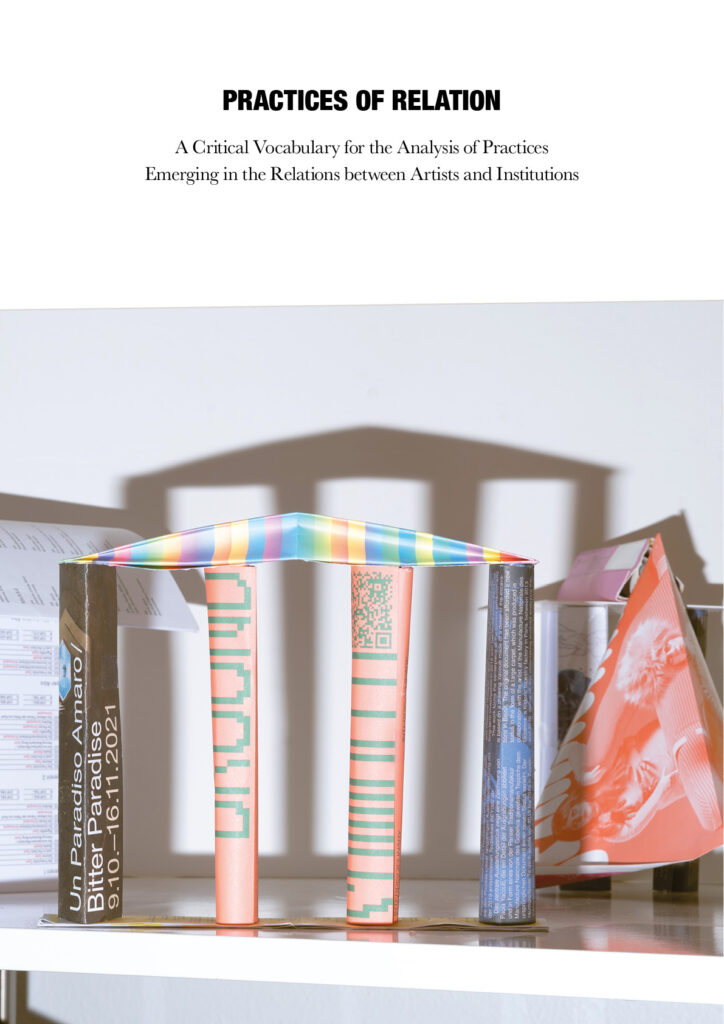
Kunst im Zeitalter der Neuverhandlung von Deutungshoheit: “Practices of Relation” erforscht Praxen von Künstler_innen die in kritischen Bezugsformen zu Kulturinstitutionen entstehen.
Während Kulturorganisationen mit institutionellem Anspruch wie Pilze aus dem Boden schießen, stehen Künstler_innen vor der Entscheidung sich diesen anzupassen oder zu entziehen. Oder aber wir stellen die Frage nach der Beziehung zwischen Kunst und Institution neu. Die Studie mit dem Titel “Practices of Relation” nimmt die Beziehung zwischen Kunstpraxen und Kulturinstitutionen unter die Lupe und zeigt auf, wie Kunstschaffende Institutionen nicht nur kritisieren, sondern ihre Form und Wirkung auch für emanzipatorische Zwecke aneignen.
Der Ansatz der Arbeit wurzelt in der Geschichte des Museums als “verdinglichter kognitiver Infrastruktur” und der Konzeptkunst, die aus institutionalisierter Kunstausbildung hervorgegangen ist. So entsteht eine differenzierte Perspektive auf Institutionen, insbesondere auf die Frage, warum sie für Künstler_innen und Aktivist_innen als Orte gelten die es Wert sind, angeeignet zu werden.
Die Arbeit beginnt mit einem Überblick über verschiedene Konzepte von Institutionen und Praxis, die in neueren Versuchen einer Historisierung der Institutionskritik zu finden sind. Anschließend wird der Begriff der Institution in verschiedenen Diskursfeldern untersucht, insbesondere im Hinblick auf ihre kognitiven Auswirkungen und ihre Rolle bei der Kategorisierung von Wissen un der Produktion von Wahrheit. Das Museum als dominante Form der Kulturinstitution wird durch dessen politische Geschichte ebenfalls genauer behandelt. Anhand einer Fallstudie des “Museum of Capitalism” analysiert die Arbeit emanzipatorische Formen der Nachahmung, wie beispielsweise Präfiguration, “anticipatory representation” und Überaffirmation, die in institutionskritischen Praxen von Künstler_innen und Aktivist_innen eine zentrale Rolle spielen. Schließlich werden Cluster analytischer Komponenten für die Konzeptualisierung von Praxen vorgestellt, die nicht als Mittel zum Zweck, sondern als Ausdruck von Haltungen und Strategien der Künstler_innen verstanden werden müssen.
Im Fazit wird dieses Phänomen in einen größeren zeitgenössischen Kontext einer Neuverhandlung der Macht über Wahrheitsbildung einordnet, in dem die Anzahl von Organisationen die einen institutionellen Anspruch erheben zunimmt. Kunstpraxen, die emanzipatorische Formen der Nachahmung von Institutionalität einsetzen, werden hier zu Orten der öffentlichen Neuverhandlung von Vorstellungshorizonten und einem Modus der Subjektivierung von Künstler_innen.
“Practices of Relation” liefert einen Beitrag zur kritischen Auseinandersetzung mit der komplexen Beziehung zwischen Kunst und Institutionen und eröffnet Perspektiven auf die kritische Analyse von institutionskritischen Kunstpraxen, die diese nicht nur als opportunistische oder antagonistische Positionen verstehen, sondern auch als Werkzeuge für emanzipatorische Praxen.
ABSTRACT
“Practices of Relation” explores the conceptualization of artists’ practices that have recently emerged in critical relation to institutions.
Given the increasing demand for artists to provide critical quasi-services to institutions and the incentives for artists to adapt their practices to a context in which art organizations claiming institutional status are proliferating, it is necessary to shift the analytical perspective to the relationship between practices and institutions. This is addressed by examining how patterned activity and the emergence of institutions from patterns of cognition and practice are linked. The resulting analytical framework is rooted in the history of the museum as reified cognitive infrastructure and the history of conceptual artists’ practices stemming from institutionalized art education. It offers the possibility of a differentiated engagement with institutions, in particular why artists and activists consider them “sites worth seizing” through practices involving the critical study of institutions, self-organization, and emancipatory imitation.
The thesis begins with a survey of the concepts of institutions found in recent attempts to historicize institutional critique. It then analyzes the concept of institutions across different fields of discourse, particularly on cognitive and truth-making powers of institutions in the work of sociologist-anthropologist Mary Douglas, and in the political history of museums. Through a case study of the Museum of Capitalism, the thesis then examines the conceptualization of emancipatory forms of imitation, such as prefiguration, anticipatory representation, and over-affirmation, which are at the core of critical practices emerging in relation to institutions. Finally, the thesis proposes clusters of analytical components for the conceptualization of practices. These are grouped by additive processes such as corporate redesign, subtractive strategies such as refusal, maintenance as political work, and institutionalized appropriation. I will argue that these must be understood not as means to an end, but as expressions of Haltungen (dispositions) as part of artists’ work. In the conclusion, this is situated in a wider contemporary phenomenon where the proliferation of organizations claiming institutional status is part of a renegotiation of powers over the making of truth, among which artists’ practices employing forms of emancipatory imitation of institutionality become a mode of subjectivation through practices of relation.